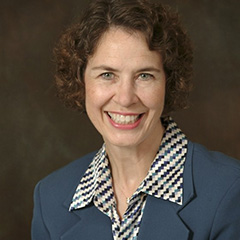
Biography
More and more the nursing profession is focusing on evidence-based practice to guide patient care.
That’s why Joan Austin spent 20 years researching epilepsy in children and developing research opportunities at IUSON. As a staff nurse in a children’s psychiatric hospital, Austin noticed that 2 of the 12 children in her unit had epilepsy, causing her to ponder the link between mental health and epilepsy. Her interest in the condition was amplified when her daughter was diagnosed with epilepsy after a having a series of seizures one morning.
After Austin earned her master’s from IUSON, she was the first student to graduate from Indiana University’s doctoral program with a research focus in epilepsy. Postdoctoral opportunities in nursing were few and far between, so she immediately joined the faculty at IUSON. After a long struggle to acquire funding, she dove into her research on epilepsy. Some were concerned she wouldn’t be objective because her own daughter had the condition she was researching.
“Over the years, I have never found my personal experience with epilepsy to be anything but an asset,” Austin wrote in her article, A career in nursing research: A personal journey. “Although my daughter has long out- grown her epilepsy and has gone on to have a successful academic career and family, I know that this is not the case for far too many people with childhood epilepsy.”
Her research on the mental health of children with epilepsy transformed in a number of aspects throughout her research career. For instance, Austin grounded her early research in family stress theory and attitude theory. As her findings showed that family variables more strongly predicted behavioral function in children with asthma than in children with epilepsy, she combined those psychological models with an understanding of illness-related variables.
She also served as a senior mentor for a number of young faculty and supported a research center that focused on quality of life and chronic illness.
“Angela McBride and I really wanted to develop young and talented researchers, and the Center for Quality of Life and Chronic Illness made that possible,” she said. “I loved working with students and then watching them go. My impact can be seen in all of the nurse scientists we supported.”

